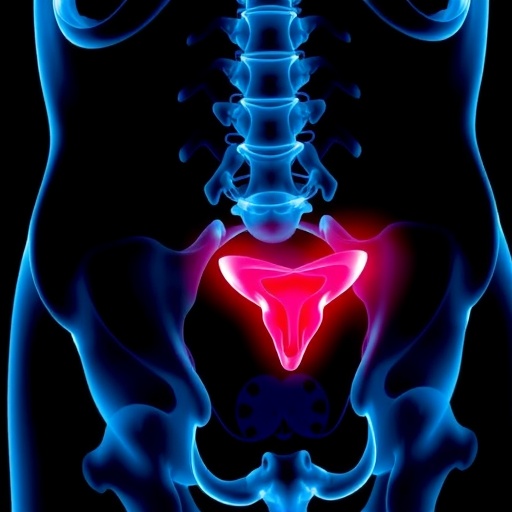In a groundbreaking phase Ib clinical trial published in BMC Cancer, researchers have unveiled promising results exploring the combination of toripalimab, an immune checkpoint inhibitor, with standard concurrent chemoradiotherapy (CCRT) for the treatment of locally advanced cervical cancer (LACC). This study marks an important step in the relentless quest to improve survival outcomes and reduce recurrence in cervical cancer patients facing advanced stages of the disease. The trial’s comprehensive analysis sheds light on both the efficacy and safety profile of this novel therapeutic approach, which could potentially reshape current cervical cancer management paradigms.
Locally advanced cervical cancer, classified typically between stages IB3 and IVA according to FIGO 2018, represents a significant clinical challenge due to its poor prognosis and high risk of metastasis despite aggressive treatment. Standard treatment predominantly involves a combination of radiation therapy and chemotherapy—commonly cisplatin—administered concurrently to maximize tumor control. However, disease recurrence and progression remain substantial barriers to achieving long-term remission. Immune checkpoint inhibitors (ICIs) have revolutionized treatment in several malignancies by disrupting cancer cells’ ability to evade immune surveillance, sparking interest in their incorporation into cervical cancer regimens.
This trial enrolled 30 patients, all receiving an integrated protocol combining pelvic external beam radiotherapy (50.4 Gy delivered over 28 fractions), brachytherapy (30 to 36 Gy across 5 to 6 fractions), weekly cisplatin chemotherapy, and biweekly administration of toripalimab at 240 mg. Unlike previous phase III trials which produced conflicting results regarding ICI efficacy with chemoradiotherapy, this single-arm phase Ib study offers a focused examination of toripalimab’s potential synergistic effect when paired with CCRT in this patient population.
The primary endpoints emphasized treatment safety and tolerability, given the known toxicities associated with CCRT and immunotherapy. The researchers observed that 80% of the participants experienced grade 3 or higher treatment-related adverse events (TRAEs). Hematologic toxicities dominated, with leukopenia affecting 63%, lymphopenia observed in 37%, and anemia presenting in 27% of patients. Notably, immune-related hemophagocytic lymphohistiocytosis (HLH) prompted treatment discontinuation in one case, highlighting the importance of vigilant monitoring for severe immune side effects.
Late radiation-induced toxicities were also a concern; 66.7% of patients reported complications such as rectal hemorrhage (53.3%), hematuria (10%), and peripheral sensory neuropathy (13.3%) during follow-up. While no treatment-related deaths occurred, the augmentation of radiotherapy-related adverse events by the addition of toripalimab underscores the need for refined identification of patient subgroups who might benefit most without undue risk.
Despite the toxicity profile, the efficacy data were remarkable. All participants achieved an objective response rate (ORR) of 100%, with radiologic assessments confirming complete or partial tumor regression as the best response. This unprecedented ORR suggests that toripalimab may robustly enhance the antitumor immune response when combined with conventional chemoradiotherapy modalities, potentially overcoming resistance mechanisms that have hindered previous efforts.
Progression-free survival (PFS) rates at two years post-treatment were equally encouraging, reaching 90%. Impressively, the median PFS was not reached during the median follow-up period of 27.3 months, indicating durable disease control in the majority of study subjects. This contrasts favorably with historical controls, where late-stage cervical cancer frequently culminates in relapse and metastasis within shorter intervals.
The design of this trial incorporated rigorous radiation dosing schedules and precise immunotherapy timing to exploit the synergistic effects of CCRT and checkpoint blockade. By integrating toripalimab every two weeks, clinicians aimed to maintain sustained checkpoint inhibition throughout the radiosensitization and cytotoxic chemotherapy phases. This concept is grounded in the understanding that radiation can enhance neoantigen presentation, potentially priming more effective immune responses that ICIs can then amplify.
However, the heightened immune activity may paradoxically contribute to increased inflammation and collateral tissue damage, as reflected in the observed late toxicities and severe immune-related adverse events. These findings suggest that future investigations should further explore biomarkers predictive of both efficacy and toxicity to enable personalized treatment strategies.
The trial’s single-arm nature and limited sample size warrant cautious interpretation of the results, highlighting the necessity of controlled, larger-scale phase II or III studies to confirm findings and establish definitive clinical guidelines. Nonetheless, this investigation stands as a testament to the evolving landscape of cervical cancer therapeutics, merging immunotherapy with established radiochemotherapeutic regimens.
Moreover, this research contributes to the broader oncology field’s efforts in harnessing the immune system alongside traditional modalities, reinforcing a paradigm shift toward combinatorial treatments. If future trials replicate these results, integrating toripalimab or similar PD-1/PD-L1 inhibitors may become a standard adjunct in treating locally advanced cervical malignancies.
In conclusion, the phase Ib trial demonstrated the dual-edged nature of combining toripalimab with concurrent chemoradiotherapy—unleashing high antitumor activity paired with significant adverse event challenges. Careful balancing of therapeutic benefits against potential risks will be crucial in refining this approach. These insights pave the way for deeper mechanistic studies and optimization of integrated immunoradiotherapy protocols.
Continued research and clinical vigilance will ultimately determine whether this innovative combination can enhance cure rates and quality of life for patients with this aggressive cancer type. The oncology community eagerly anticipates forthcoming data from expanded studies to establish toripalimab-enhanced CCRT as a feasible, effective, and safe treatment avenue.
Subject of Research:
Evaluation of safety and efficacy of toripalimab combined with concurrent chemoradiotherapy in locally advanced cervical cancer.
Article Title:
Safety and efficacy of toripalimab plus concurrent chemoradiotherapy for locally advanced cervical cancer: a single-arm, phase Ib trial.
Article References:
Jiang, P., Wei, S., Li, C. et al. Safety and efficacy of toripalimab plus concurrent chemoradiotherapy for locally advanced cervical cancer: a single-arm, phase Ib trial. BMC Cancer 25, 1566 (2025). https://doi.org/10.1186/s12885-025-15059-y
Image Credits: Scienmag.com
DOI: https://doi.org/10.1186/s12885-025-15059-y
Tags: challenges in treating advanced cervical cancerchemoradiotherapy for locally advanced cervical cancercombination therapy for cervical cancerefficacy of concurrent chemoradiotherapyFIGO staging for cervical cancerImmune checkpoint inhibitors in cancer therapyimproving survival outcomes in cervical cancerinnovative approaches to cervical cancer managementphase Ib clinical trial resultsreducing recurrence in advanced cervical cancersafety profile of toripalimabtoripalimab cervical cancer treatment





